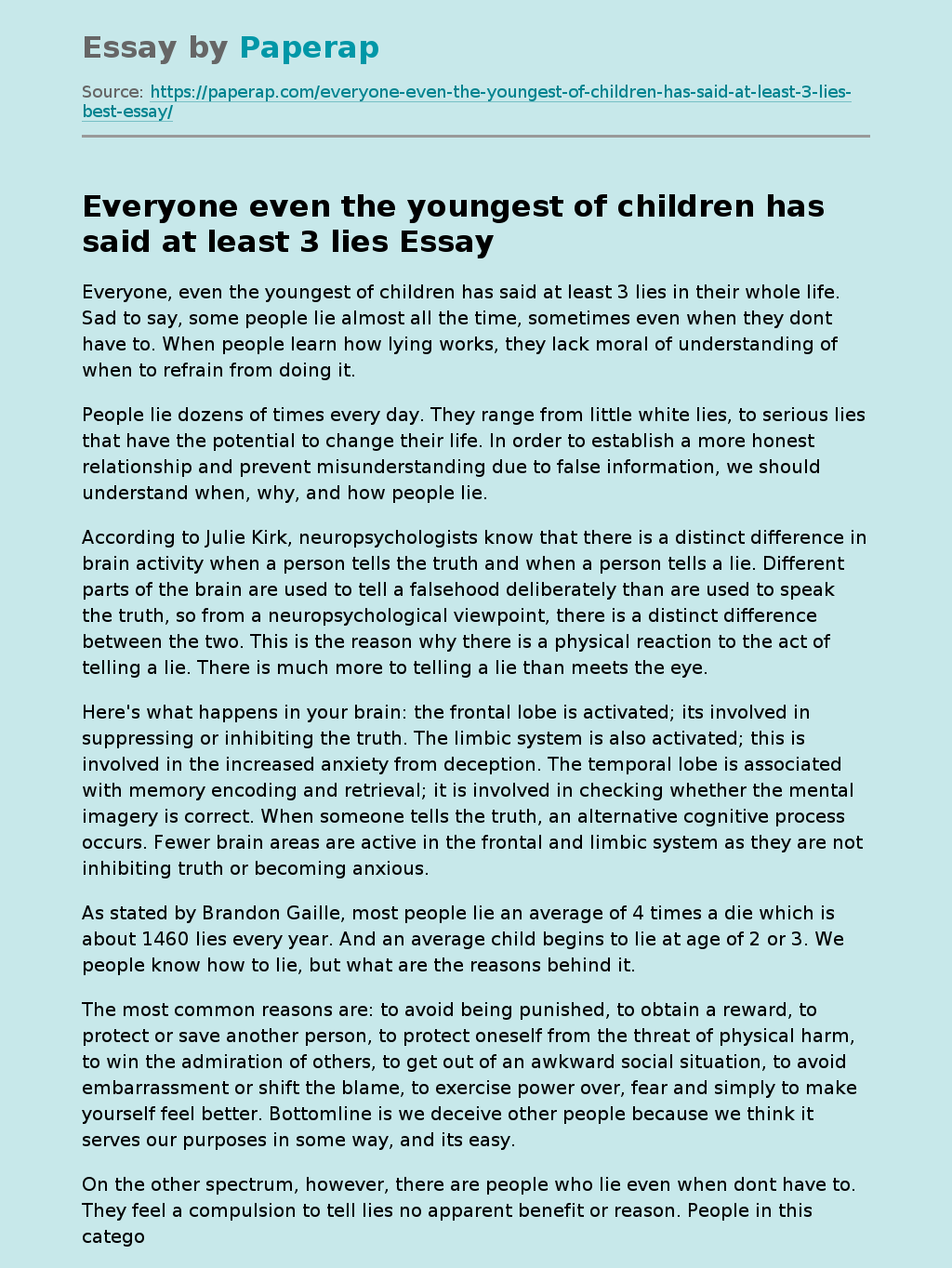Everyone even the youngest of children has said at least 3 lies
Everyone, even the youngest of children has said at least 3 lies in their whole life. Sad to say, some people lie almost all the time, sometimes even when they don’t have to. When people learn how lying works, they lack moral of understanding of when to refrain from doing it. People lie dozens of times every day. They range from little white lies, to serious lies that have the potential to change their life. In order to establish a more honest relationship and prevent misunderstanding due to false information, we should understand when, why, and how people lie.
According to Julie Kirk, neuropsychologists know that there is a distinct difference in brain activity when a person tells the truth and when a person tells a lie. Different parts of the brain are used to tell a falsehood deliberately than are used to speak the truth, so from a neuropsychological viewpoint, there is a distinct difference between the two. This is the reason why there is a physical reaction to the act of telling a lie.
There is much more to telling a lie than meets the eye.
Here’s what happens in your brain: the frontal lobe is activated; it’s involved in suppressing or inhibiting the truth. The limbic system is also activated; this is involved in the increased anxiety from deception. The temporal lobe is associated with memory encoding and retrieval; it is involved in checking whether the mental imagery is correct. When someone tells the truth, an alternative cognitive process occurs.
Fewer brain areas are active in the frontal and limbic system as they are not inhibiting truth or becoming anxious.
As stated by Brandon Gaille, most people lie an average of 4 times a die which is about 1460 lies every year. And an average child begins to lie at age of 2 or 3. We people know how to lie, but what are the reasons behind it. The most common reasons are: to avoid being punished, to obtain a reward, to protect or save another person, to protect oneself from the threat of physical harm, to win the admiration of others, to get out of an awkward social situation, to avoid embarrassment or shift the blame, to exercise power over, fear and simply to make yourself feel better. Bottomline is we deceive other people because we think it serves our purposes in some way, and it’s easy.
On the other spectrum, however, there are people who lie even when don’t have to. They feel a compulsion to tell lies no apparent benefit or reason. People in this category often qualify for a diagnosis of a mental health disorder as designated by the American Psychiatric Association’s Diagnostic and Statistical Manual of Mental Disorders (DSM).
In ordinary life, we can’t give polygraph tests to people we meet or bring lie detectors, but we can be aware of certain behaviors and characteristics that tell us that others may be lying. Most common are: changes in vocal pitch, unusual blinking or fidgeting, the use of fewer first-person words such asI, using negations, difficulty making eye contact when speaking, the use of self-soothing techniques such as collar pulling, or mouth covering and, inconsistent gestures or facial expressions that contrast with message content, and they try too hard to be honest, saying phrases such asto be honest.
Lying seems simple and harmless, but it may become an addiction. When people get away with lie, it often drives them to continue doing it, and in the process, we often ruin relationships, hurt others, lose integrity and peace. And soon you find yourself trapped and it becomes a habit and a tragic cycle that never ends up in a happy ending.
Lying is extremely stressful. It causes you to be constantly worrying and wondering who might find out the lies you told. You’re always running through the lies you’ve told, trying to keep track of what you’ve told to which person, and what’s the next lie you need to tell.
People lie yet they are constantly looking for someone they can trust. People are actually much more perceptive and aware of who tells the truth and who doesn’t. Over time, honesty shows itself as a trait that is beautiful and deeply respected. Deceiving people is easy but it always build trust issues and ruin relationships.
Everyone even the youngest of children has said at least 3 lies. (2019, Dec 19). Retrieved from https://paperap.com/everyone-even-the-youngest-of-children-has-said-at-least-3-lies-best-essay/

